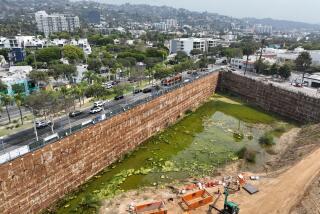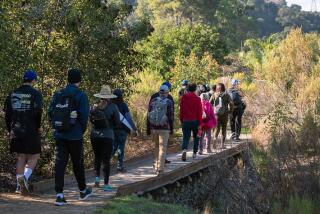Renewing a Fowled-Up Lake
- Share via
Engineers hired for Fullerton’s first phase in cleaning up Laguna Lake showed up near its banks Saturday to hear the neighbors’ ideas on what should be done.
The experts got an earful, especially when neighbors began arguing among themselves over one of the lake’s main problems--its overpopulation of ducks and geese.
The 7-acre lake, built as a private irrigation pond near the turn of the 20th century, was taken over by the city about five decades ago for fishing and other passive recreation. Since then the lake has become polluted from runoff and excrement from the waterfowl. Lack of oxygen in the water is threatening its fish.
The city received a $2-million state grant to help with the clean-up, which will mean dredging, probably in 2003, and relocating much of the waterfowl.
Chris Webb, of Moffatt & Nichol Engineers of Long Beach, told those who attended Saturday’s outdoor hearing that whatever plans are adopted, control of duck feeding is a certainty. That angered some who hike along the lake’s trail and enjoy feeding the ducks.
“I’m not giving them old bread; I’m feeding them eight pounds of cracked corn a day,” said resident Jess Miller. “What’s wrong with that?”
What’s wrong, answered Webb, is that people are feeding the ducks such a variety of food that they lose their natural instinct to find food on their own. That can make them aggressive if that food supply is cut off.
“You’ve got to clamp down on the feeding,” Webb said. “One solution may be to have duck food provided and let the experts set a diet for a controlled feeding pattern.”
Many residents agreed.
“We have champagne tastes on a beer budget,” said resident Judy Guarienti. “I like the ducks too, but we have to concentrate our efforts on improving the lake.”
There was no shortage of ideas. Many people urged the engineers to ensure the lake maintains a natural look. That would mean a minimum of ancillary improvements, such as better fencing and more playground equipment.
But Webb cautioned that any project like the lake’s restoration means the city will have to comply with standards set by the Americans with Disabilities Act, or ADA. Right now, for example, restrooms don’t meet standards, and the trail isn’t as accessible as it needs to be to satisfy the ADA.
Many of the solutions are complex. One resident said she loved the lake’s lily pads. But an aerial view of the lake shows that more than one-fourth of its surface is covered with lily pads. Biologist Noel Davis, hired to help with the restoration project, said the lily pads interrupt the photosynthesis process and take up oxygen that the fish need.
No one disagreed that the lake needs a good cleaning. The engineers could only nod when resident Bill Haas described the lake as “a rotting pot of tea.”
But there was good news, Webb said. Soil and fish tests indicate things are not as bad as first thought. Silt from the bottom was found to be nontoxic and the fish are still edible. But the water quality does not meet state standards and the lake is sending contaminants to the ocean that must be cleaned up.
Several raised the issue of the concrete wall the city had established along the lake’s shore to stop soil erosion. They argue that it disrupted the natural food chain around the lake. They’d like to see the wall gone.
“We have made no decisions yet on anything,” said engineer Lloyd Jenkins. “We’re still conducting tests and gathering information.”
One answer Jenkins gave that nobody liked, though they understood: When restoration work finally begins, the surrounding trails will almost certainly have to be closed.
Afterward, Webb said the public hearing had been “really valuable.”
“This is a community-driven project,” he said. “We’re only here to use our technology to help the community.”
One resident had asked what guarantee the people had that their ideas would be implemented in the final plan. Webb responded that there would be another public hearing in six weeks, two hearings before the Community Service Commission and a City Council hearing.
More to Read
Sign up for Essential California
The most important California stories and recommendations in your inbox every morning.
You may occasionally receive promotional content from the Los Angeles Times.













